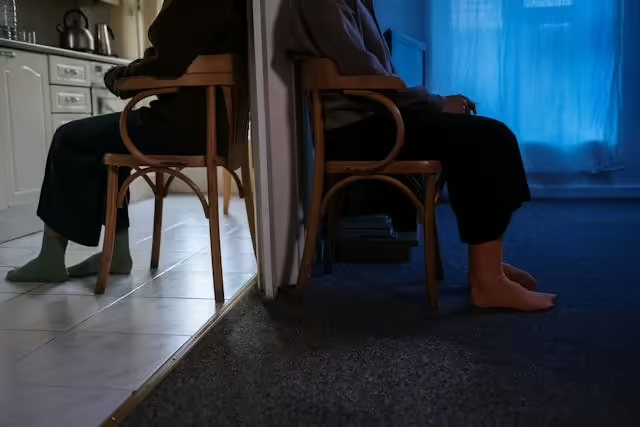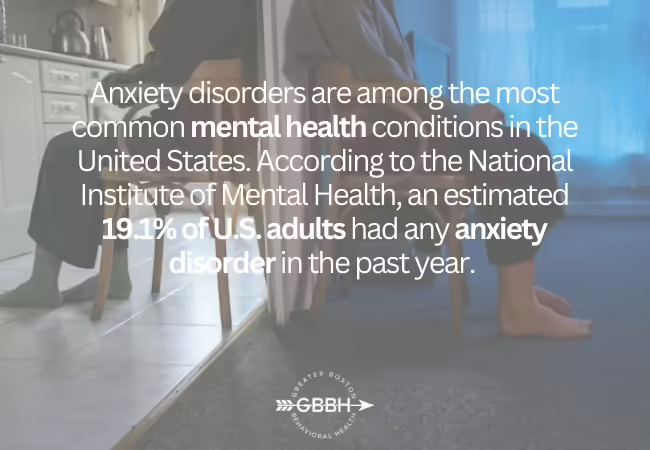In the landscape of mental health treatment, finding the right medication can be a pivotal step toward managing anxiety effectively. Pristiq (desvenlafaxine), an SNRI (serotonin-norepinephrine reuptake inhibitor), is increasingly recognized for its efficacy in treating not only depression but also generalized anxiety disorder (GAD) and other anxiety-related conditions. At Greater Boston Behavioral Health, we incorporate Pristiq into our extensive array of Mental Health Treatment Programs to provide a multi-faceted approach to anxiety management.
This guide delves deeply into the benefits of Pristiq, its role in treating anxiety, and how it integrates with other therapeutic strategies to enhance mental health and overall well-being.
Understanding Pristiq: What It Is and How It Works
Pristiq, the brand name for desvenlafaxine, is an SNRI (serotonin-norepinephrine reuptake inhibitor) that has become a key player in the treatment of major depressive disorder and anxiety. Its mechanism of action revolves around altering the brain’s chemistry to improve mood and alleviate the symptoms associated with anxiety and depression.
Mechanism of Action:
Pristiq functions by inhibiting the reuptake of two important neurotransmitters in the brain: serotonin and norepinephrine. This inhibition increases the availability of these chemicals in the neural synapses, enhancing neurotransmission and leading to improved mood and cognitive function. The specifics include:
- Serotonin Effects: By boosting serotonin levels, Pristiq helps enhance overall mood, which is crucial in mitigating the pervasive feelings of anxiety. Serotonin also plays a significant role in sleep regulation, appetite control, and pain perception, all of which can be disrupted by anxiety.
- Norepinephrine Effects: Norepinephrine is linked to the body’s ‘fight or flight’ response, which can be overactive in people with anxiety. Increasing norepinephrine levels helps counteract this overactivity, reducing physical symptoms of anxiety like heart palpitations and muscle tension, and improving concentration and energy levels.
While some patients may begin to notice improvements within the first week or two of treatment, it typically takes several weeks of consistent use to experience the full benefits of Pristiq. It’s important for patients to maintain open communication with their healthcare providers about their progress and any side effects they may experience.
The Benefits of Pristiq in Treating Anxiety
Pristiq is known for its robust efficacy in the management of anxiety, providing relief across various dimensions of the disorder.
1. Comprehensive Symptom Management
- Emotional Symptoms: Pristiq helps in reducing symptoms such as excessive worry, nervousness, and feelings of dread by stabilizing mood and decreasing anxiety levels.
- Physical Symptoms: It alleviates somatic symptoms associated with anxiety, including headaches, stomach upset, and muscle tension, thereby improving physical well-being and daily functioning.
2. Cognitive Improvements
- Enhanced Focus: Anxiety can scatter cognitive resources, making concentration difficult. Pristiq helps in sharpening focus and enhancing clarity of thought, allowing individuals to perform better in work and personal life.
- Decision Making: By reducing the overwhelming influx of anxious thoughts, Pristiq allows for clearer thinking and more rational decision-making.
3. Quality of Life Enhancements
- Sleep Improvements: By moderating the levels of serotonin and norepinephrine, Pristiq can help normalize sleep patterns, which are often disrupted by anxiety.
- Social Interactions: With reduced anxiety, individuals often find it easier to engage in social activities and maintain relationships, which are essential for emotional health and well-being.
Integrating Pristiq into a Holistic Treatment Plan
Pristiq is most effective when part of a comprehensive treatment plan that includes psychotherapy, lifestyle changes, and support mechanisms.
1. Medication Management
- Individualized Treatment: Dosage and treatment duration are tailored to each patient’s specific needs, taking into account their medical history, symptom severity, and treatment response.
- Monitoring and Adjustments: Regular follow-up appointments are crucial to monitor effectiveness and adjust the treatment plan as necessary. This ensures optimal results and minimizes side effects.
2. Psychotherapy Integration
- Cognitive Behavioral Therapy (CBT): CBT is a cornerstone of anxiety treatment that works exceptionally well with Pristiq. It addresses negative thought patterns and behaviors, providing strategies to manage and reduce anxiety.
- Psychoeducation: Educating patients about anxiety and its management, including how Pristiq works, enhances treatment adherence and outcomes.
3. Supportive Therapies
- Group Therapy: Offers a platform for sharing experiences and strategies, reducing feelings of isolation and promoting recovery through peer support.
- Family Therapy: Helps family members understand the challenges of living with anxiety and creates a supportive home environment, which is crucial for effective management and recovery.
4. Lifestyle Modifications
- Stress Management Techniques: Practices such as mindfulness, meditation, and yoga can complement the effects of Pristiq by reducing stress and promoting relaxation.
- Physical Activity: Regular exercise is beneficial in reducing symptoms of anxiety and boosting overall mood, enhancing the effectiveness of Pristiq.
Patient Suitability for Pristiq
Pristiq, known for its efficacy in treating depression and anxiety, is suitable for adults who may not have responded adequately to other medications. However, its use must be carefully considered based on individual health profiles and specific mental health needs.
Ideal Candidates for Pristiq:
- Adults with Generalized Anxiety Disorder (GAD): Especially those who have experienced persistent symptoms despite other treatments.
- Patients with Major Depressive Disorder (MDD): Particularly when anxiety symptoms are also present.
- Individuals with Chronic Pain Syndromes: As Pristiq can help manage the neuropathic components often associated with chronic pain conditions.
Contraindications:
- Patients with Severe Liver or Kidney Disease: These conditions can affect how Pristiq is metabolized and excreted.
- Individuals on Monoamine Oxidase Inhibitors (MAOIs): Awaiting a clearance period before starting Pristiq is necessary to avoid serious interactions.
- People with Uncontrolled Hypertension: Due to the potential for Pristiq to increase blood pressure.
Can You Overdose on Pristiq?
Overdosing on Pristiq is possible, particularly if taken in amounts exceeding the prescribed dosage. An overdose can lead to severe health complications and requires immediate medical attention.
Symptoms of Overdose May Include:
- Extreme Dizziness or Nausea
- Rapid Heart Rate or High Blood Pressure
- Seizures or Altered Mental Status
Preventive Measures:
- Strict Adherence to Prescribed Dosages
- Regular Medical Supervision
- Educating Patients on the Importance of Dosage Compliance
Monitoring and Managing Side Effects
While Pristiq is effective, it can cause side effects, which should be monitored closely and managed proactively to ensure patient safety and comfort.
Common Side Effects:
- Gastrointestinal Distress: Such as nausea, constipation, or dry mouth.
- Sleep Disturbances: Including insomnia or excessive sleepiness.
- Sexual Dysfunction: Such as decreased libido or difficulty achieving orgasm.
Management Strategies:
- Regular Check-Ups: To adjust the dosage if necessary and address any bothersome side effects.
- Supportive Therapies: Such as dietary adjustments for GI issues or counseling for sexual side effects.
- Patient Education: Ensuring patients understand what side effects to expect and when to seek help.
Pristiq Dosage Guidelines
The effective dosage of Pristiq varies depending on the individual’s specific condition, response to treatment, and any co-existing health issues.
Standard Starting Dose:
- 50 mg daily, typically administered once per day with or without food.
Dosage Adjustments:
- May be increased based on efficacy and tolerability but typically does not exceed 100 mg per day.
- Special Considerations: For those with renal impairment or those aged 65 and over, lower starting doses may be prudent.
How Long Does Pristiq Stay in Your System?
Understanding the pharmacokinetics of Pristiq is important for managing discontinuation and transitioning between treatments.
Half-life:
- Approximately 11 hours, meaning it takes about 11 hours for the concentration of Pristiq in the blood to reduce by half.
Complete Elimination:
- Typically within a few days, though effects related to mood improvement may diminish more gradually.
Is Pristiq for Anxiety Right for You?
Deciding whether Pristiq is the right medication involves considering several factors, including medical history, current health conditions, and previous responses to treatments.
Assessment Includes:
- Evaluating Symptom Severity: To determine the appropriateness of Pristiq as a treatment option.
- Reviewing Medical and Drug History: To avoid potential interactions and side effects.
- Discussing Patient Preferences and Concerns: Ensuring patients are comfortable with their treatment plan.
Conclusion
Pristiq represents a significant advancement in the treatment of anxiety and depression. For those struggling with these conditions, it offers a chance for relief and a return to normalcy. However, like all medications, it requires careful consideration and management to maximize benefits while minimizing risks. At Greater Boston Behavioral Health, we provide comprehensive care that includes detailed assessment and personalized treatment planning to ensure that Pristiq, or any other medication, is used safely and effectively. If you are considering Pristiq for your anxiety, consult with our healthcare providers to make an informed decision that aligns with your overall health goals. Call us at (888)278-0716 today to learn more about our services and how we can help you on your journey to recovery!
FAQ on Pristiq for Anxiety
What is Pristiq and how does it work for treating anxiety?
Pristiq is an SNRI medication that helps manage anxiety by increasing serotonin and norepinephrine levels in the brain, improving mood and reducing anxiety symptoms.
Who is suitable for Pristiq treatment?
Pristiq is suitable for adults with Generalized Anxiety Disorder (GAD) or Major Depressive Disorder (MDD) who have not adequately responded to other treatments. It is not recommended for those with severe liver or kidney disease or those on MAOIs.
Can you overdose on Pristiq?
Yes, overdosing on Pristiq is possible and can be dangerous, leading to symptoms such as extreme dizziness, rapid heart rate, and seizures. It is crucial to adhere strictly to prescribed dosages.
What are the common side effects of Pristiq?
Common side effects include nausea, dizziness, dry mouth, sweating, insomnia, and sometimes sexual dysfunction. Most side effects are mild and manageable with proper medical guidance.
How should Pristiq be dosed?
The standard starting dose of Pristiq is 50 mg daily, which may be adjusted based on individual response and tolerability. Dosages typically do not exceed 100 mg per day.
How long does Pristiq stay in your system?
Pristiq has a half-life of about 11 hours, meaning it takes approximately 11 hours for half of the dose to be eliminated from the body. It is generally completely cleared from the system within a few days.
Is Pristiq a good option for treating anxiety?
Pristiq can be an effective treatment for anxiety, especially in cases where other medications have failed. However, it should be part of a comprehensive treatment plan that may include therapy and lifestyle changes.


